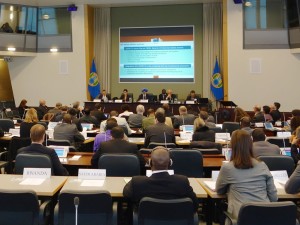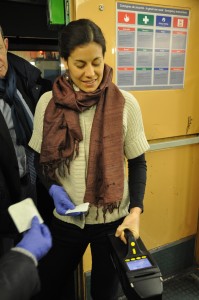Five-Year Updates: Meet Ivette Tarrida-Soler, F09
We’re almost at the end of the Five-Year Updates from the Class of 2009, especially as they have nearly reached six years since graduating. Today’s update comes from Ivette Tarrida-Soler, who was a favorite member of the student-intern team in Admissions during her two Fletcher years. Let’s hear what she’s been up to.

Photo credit: Organisation for the Prohibition of Chemical Weapons
Five years after Fletcher, I am now what you would call a “Eurocrat” – and proud of it! I became an official of the European Union in 2011, two years after finishing my MALD at Fletcher. Public service has always been my main objective, but I have been lucky to get experience in a variety of sectors. So today I feel like I am only beginning what I hope will be a long career in the European institutions, serving European citizens and representing the EU on the global stage.
Before Fletcher
I grew up in Igualada, near Barcelona, but got my BA at Bryn Mawr College, a women’s liberal arts college near Philadelphia. There are so many aspects of this experience that opened my mind to the world, that the B.A. in Political Science seems only an afterthought. My early professional experience at the end of university was in human rights law. During my last summer of college, I conducted research for cases related to human rights violations in Nigeria, and afterwards I worked for two years at the law firm Kohn, Swift & Graf, P.C., in central Philadelphia, as a paralegal for cases related to the violation of human rights during the Marcos dictatorship in the Philippines, and to the international financing of terrorism.
This pre-Fletcher experience opened a path into a career in “something international.” My understanding of what that was, exactly, was very immature, and probably still is — but let’s just call it a good dose of “curiosity.” In any case, professional experience was key to understanding what I wanted from graduate school — which is why I gave up law school for Fletcher!
At Fletcher
Being at Fletcher felt like academic luxury, and yet put me so close to practitioners from around the world. I was able to explore various disciplines: I focused on international security and designed my own focus on energy security, but also took courses on humanitarian aid and nutrition, economics, law, and in-depth studies into Iran and China. During the summer, I traveled to Jordan with a group of civil-military students from Tufts University and the U.S. military academies, to do research into the impacts that the Iraq war was having on that country. I wrote my thesis on nuclear proliferation while being a research associate with the nearby Belfer Center for Science and International Affairs. Both in 2007 and 2008, I participated in the SIMULEX crisis management exercises organized by the International Security Studies Program. Some of my fondest memories, however, are of the wonderful staff at the Fletcher’s Admissions Office, where I worked part-time, and of the prospective students who visited the school or contacted us with questions.
After Fletcher
After graduating from Fletcher in 2009, I moved back to Europe to do a one-year traineeship at the European Commission’s Joint Research Centre in Italy. I was part of a project that looked into the link between the exploitation of natural resources and armed conflict through Geographical Information System (GIS) analysis. I worked alongside engineers as the rare social scientist in the team, and learned a lot about the potential uses of mapping and geo-location analysis to study and respond to conflicts, forced migration, and humanitarian emergencies.
Then I went on to work as a political risk analyst at Maplecroft, a UK consultancy, where I carried out research and analysis of political, economic, regulatory and societal events worldwide, interpreting trends and evaluating the ensuing risks and implications for businesses operating internationally.

In 2011, I became a public official of the European Union. I first worked at the European Parliament’s Committee on Petitions, which looks into possible breaches of EU law around Europe and which is the only committee that directly communicates with European residents, receiving their petitions and inviting them to attend committee meetings in order to present and to discuss issues with Members of the European Parliament. Most petitions relate to infringements of environmental laws, the right to move freely around Europe, and to violations of other fundamental rights.
Since late 2013, I have been working at the European Commission’s Directorate-General for Migration and Home Affairs, in the Terrorism and Crisis Management Unit. I work mostly on the European policies that aim to increase protection against chemical, biological, radiological and nuclear (CBRN) threats, and in particular on the implementation of Regulation (EU) 98/2013, which restricts the public’s access to chemical substances that can be used towards the illicit manufacturing of home-made explosives.
Brussels is, believe it or not, a wonderful city. And it is also home to many Flectherites, so I continue to enjoy the Fletcher spirit and dynamism after all these years.